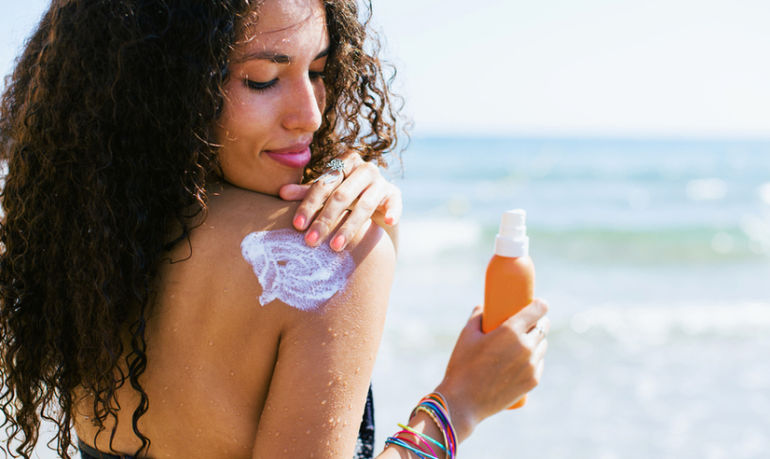
The Environmental Working Group has been investigating our sunscreens since 2007, looking into thousands of products on the market to see where the bright spots are and where we're getting burned.
Considering the fact that the rate of melanoma cases among American adults has tripled since the 1970s, we clearly need to step up our summer skin-care arsenals. But over the past 10 years, the research and advocacy group has found that nearly three-quarters of sunscreens on the market don't live up to their claims, either underdelivering on sun protection or overdoing it in the chemical department. Here's what the latest research says about the healthiest, most effective types of sun protection to throw in your beach bag.
What to avoid:
High SPFs.
While you may assume that a higher SPF means a higher level of protection from UVA (the ones that cause the skin to age over time) and UVB (the ones that cause sunburn) rays this isn't always the case. Various factors, such as brightness of light, can dramatically alter the sun protection factor. One study found that a slight change in light turned a product marketed as 100 SPF into a 37 SPF. You're better off choosing a lower SPF (one that falls under 70) and reapplying often than slopping on an 100 in the hopes that it will last all day. Because, let's be honest, you shouldn't be out in the sun all day anyways if you can help it. "Sunscreen alone may not reduce risk of melanoma, the most deadly form of skin cancer, because it prompts users to spend more time out in the sun, where they get more total UV and more sunburns," explains EWG senior research analyst Sonya Lunder.
Vitamin A.
A study by U.S. government scientists suggests that retinyl palmitate, a form of vitamin A, may speed the development of skin tumors and lesions when applied to the skin in the present of sunlight. And yet it's present in 14 percent of the beach and sport sunscreens tested this year. While more research still needs to be done, it's safe to say we probably don't want this in a product that we exclusively wear outside. The EWG recommends avoiding skin products containing various forms of vitamin A including retinyl palmitate, retinol, retinyl acetate, retinyl linoleate, and retinoic acid.
Oxybenzone.
This one's a biggie, both for health reasons (the compound acts like estrogen in the body, altering sperm production in men and promoting endometriosis in women) and environmental concerns. Besides acting as an endocrine disrupter, high concentrations of oxybenzone can also damage fragile ecosystems like coral reefs. Reefs where people do a lot of swimming, such as along Maui’s West Coast, the popular coves in the U.S. Virgin Islands, and Miami Beach in Florida are especially at risk, explains research scientist and director of the Haereticus Environmental Lab, Craig A. Downs. The same buildup is common in outdoor swimming pools, so Downs cautions against using those too. "The sanitizer chlorine used in most swimming pools will react with oxybenzone, forming chlorinated oxybenzone. This new chemical is significantly more toxic than oxybenzone."
What to lather on:
Zinc and titanium dioxide.
Before you lock yourself inside for the summer, know that today's sunscreen market isn't a total chemical fest. Since 2007, the EWG has found a dramatic increase in natural, mineral-only sunscreens, doubling from 17 percent of products to 34 percent in 2017. Their top picks include ones that contain zinc oxide and titanium dioxide. According to Lunder, products with zinc oxide or 3 percent avobenzone offer the strongest UVA protection.
Here are some of the natural sunscreens that made it to the EWG's list of approval this year. To check out the rest, head here.
- Raw Elements Eco Form Sunscreen ($16.14)
- Neutrogena Sheer Zinc Dry-Touch Sunscreen Broad Spectrum ($31.26 for pack of 3)
- Goddess Garden Organics Everyday Natural Sunscreen Lotion ($14.99)
- Babo Botanicals Clear Zinc Lotion ($12.62)
- Nature's Gate Aqua Block Sunscreen Lotion ($18.18)
~Thanks to Emma Loewe
No comments:
Post a Comment